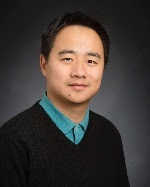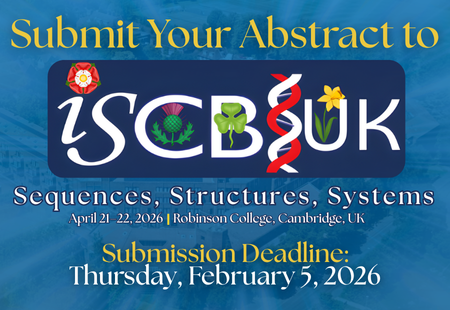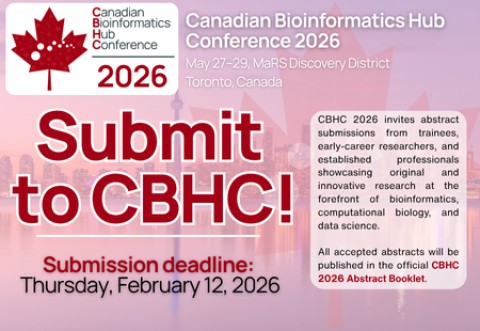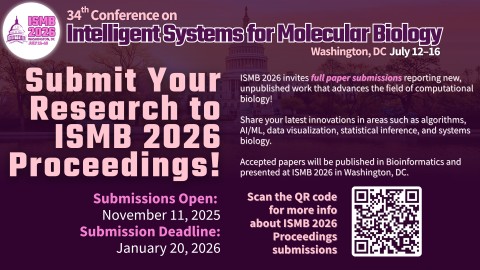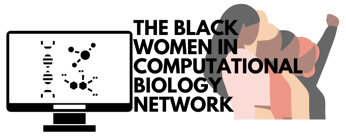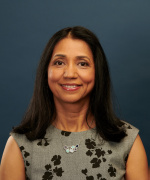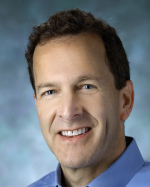Committees
ISMB 2020 Steering Committee
Nadia El-Mabrouk, Proceedings Chair, Université de Montréal, Canada
Bruno Gaeta, Treasurer, University of New South Wales, Australia
Janet Kelso, Conference Advisory Council Co-chair, Max Planck Institute for Evolutionary Anthropology, Germany
Diane E. Kovats, ISCB Executive Director, United States
Steven Leard, ISMB Conference Director, Canada
Thomas Lengauer, President, ISCB, Max Planck Institute for Informatics, Germany
Christine Orengo, Conference Advisory Council Co-chair, University College London, United Kingdom
Francis Ouellette, Conference Co-chair, Canadian Bioinformatics Workshops, Canada
Pat Rodenburg, Conference Administrator, Canada
David Sankoff, Honorary Chair, University of Ottawa, Canada
Donna Slonim, Proceedings Co-chair, Tufts University, United States
Shoshana Wodak, Conference Co-chair, VIB‐VUB Center for Structural Biology, Belgium
COSI TRACK LEADS & ABSTRACT CHAIRS
3D-SIG: Structural Bioinformatics and Computational Biophysics
Iris Antes, Technical University of Munich, Germany
Rafael Najmanovich, University of Montreal, Canada
BIOINFO-CORE
Madelaine Gogol, Stowers Institute, United States
Rodrigo Ortega Polo, Agriculture and Agri-Food Canada
Alberto Riva, University of Florida, United States
Bio-Ontologies
Robert Hoehndorf, King Abdullah University of Science & Technology, Saudi Arabia
Michel Dumontier, Maastricht University, Netherlands
BioVis: Biological Data Visualizations
Danielle Albers, University of Colorado at Boulder, United States
Cagatay Turkay, City, University of London, United Kingdom
Thomas Höllt, Leiden University Medical Center, The Netherlands
Michael Krone, University of Tübingen, Germany
Michel Westenberg, Eindhoven University of Technology, The Netherlands
CAMDA: Critical Assessment of Massive Data Analysis
David Kreil, Boku University Vienna, Austria
Joaquin Dopazo, Fundación Progreso y Salud, Spain
Paweł P Łabaj, Austrian Academy of Sciences, and Jagiellonian University, Poland
Wenzhong Xiao, Harvard Medical School, United States
CompMS: Computational Mass Spectrometry
Wout Bittremieux, University of California San Diego, United States
Oliver Kohlbacher, Universität Tübingen, Germany
Shuzhao Li, Emory University, United States
William S. Noble, University of Washington, United States
Timo Sachsenberg, Universität Tübingen, Germany
Olga Vitek, Northeastern University, United States
Jeff Xia, McGill University, Canada
Education: Computational Biology and Bioinformatics Education and Training
Annette McGrath, Australian Commonwealth Scientific and Industrial Research Organisation (CSIRO), Australia
Patricia M. Palagi, SIB Swiss Institute of Bioinformatics, Switzerland
Venkata Satagopam, University of Luxembourg
EvolCompGen: Evolution & Comparative Genomics
Lars Arvestad, Stockholm University, Sweden
Edward L. Braun, University of Florida, United States
Christophe Dessimoz, University of Lausanne, Switzerland
Function: incorporating CAFA 4: Gene and Protein Function Annotation
Iddo Friedberg, Iowa State University, United States
Mark Wass, University of Kent, United Kingdom
Kimberly Reynolds, University of Texas Southwestern Medical Center, United States
HiTSeq: High Throughput Sequencing Algorithms & Applications
Can Alkan, Bilkent University, Turkey
Ana Conesa, University of Florida, United States
Francisco M. De La Vega, Stanford University, United States
Dirk Evers, Dr. Dirk Evers Consulting, Germany
Gang Fang, Mount Sinai School of Medicine, United States
Kjong Lehmann, ETH-Zürich, Switzerland
Layla Oesper, Carleton College, United States
iRNA: Integrative RNA Biology
Yoseph Barash, University of Pennsylvania, United States
Klemens Hertel, University of California, Irvine, United States
Michelle Scott, Université de Sherbrooke, Canada
MLCSB: Machine Learning in Computational and Systems Biology
Christoph Lippert, University of Potsdam, Germany
Sara Mostafavi, University of British Columbia, Canada
Microbiome
Aaron Darling,University of Technology Sydney, Australia
Alice McHardy, Helmholtz Centre for Infection Research, Germany
Fernando Meyer, Helmholtz Centre for Infection Research, Germany
Alexander Sczyrba, Bielefeld University, Germany
NetBio: Network Biology
Martina (Tina) Kutmon, Maastricht University, Netherlands
Tijana Milenkovic, University of Notre Dame, United States
Natasa Przulj, Barcelona Supercomputing Center, Spain
RegSys: Regulatory and Systems Genomics
Ferhat Ay, La Jolla Institute, United States
Ziv Bar-Joseph, Carnegie Mellon University, United States
Anaïs Bardet, CNRS - Université de Strasbourg, France
Mathieu Blanchette, McGill University, Canada
Raluca Gordan, Duke University, United States
Shaun Mahony, Penn State University, United States
Anthony Mathelier, University of Oslo, Norway
Alejandra Medina-Rivera, National University of Mexico
Judith Zaugg, EMBL, Germany
SysMod: Computational Modeling of Biological Systems
Matteo Barberis, University of Surrey, United Kingdom
Laurence Calzone, Institut Curie, France
Andreas Dräger, University of Tübingen, Germany
Tomas Helikar, University of Nebraska-Lincoln, United States
Jonathan Karr, Icahn School of Medicine at Mount Sinai, United States
Juilee Thakar, University of Rochester Medical Center, United States
Text Mining
Cecilia Arighi, University of Delaware, United States
Lars Juhl Jensen, University of Copenhagen, Denmark
Robert Leaman, NCBI/NLM/NIH, United States
Zhiyong Lu, NCBI/NLM/NIH, United States
TransMed: Translational Medicine Informatics & Applications
Wei Gu, University of Luxembourg
Stephen MacKinnon, Cyclica, Canada
Venkata Satagopam, University of Luxembourg
Mansoor Saqi, Kings College London, United Kingdom
Maria Secrier, University College London, United Kingdom
VarI: Variant Interpretation
Emidio Capriotti, University of Bologna, Italy
Hannah Carter, University of California, San Diego, United States
Antonio Rausell, Imagine Institute for Genetic Diseases, France
General Computational Biology
Virginie Uhlmann, European Bioinformatics Institute (EMBL-EBI), United Kingdom
Xuegong Zhang, Tsinghua University, China
COVID-19 Abstract Committee
Nadia El-Mabrouk, Université de Montréal, Canada
Bruno Gaeta, University of New South Wales, Australia
Janet Kelso, Max Planck Institute for Evolutionary Anthropology, Germany
Thomas Lengauer, Max Planck Institute for Informatics, Germany
Stephen MacKinnon, Cyclica, Canada
Christine Orengo, University College London, United Kingdom
Aida Ouangraoua, Université de Sherbrooke, Canada
Francis Ouellette, Canadian Bioinformatics Workshops, Canada
Vladimir Reinharz, Université du Québec à Montréal, Canada
Sushmita Roy, University of Wisconsin-Madison, United States
David Sankoff, University of Ottawa, Canada
Russell Schwartz, Carnegie Mellon University, United States
Donna Slonim, Tufts University, United States
Shoshana Wodak, VIB‐VUB Center for Structural Biology, Belgium
Yu Xia, McGill University, Canada
Fellowship Committee
Chair: Lucia Peixoto, Washington State University, United States
Co-chair: Dimitri Perrin, Queensland University of Technology, Australia
Co-chair: Catherine Putonti, Loyola University Chicago, United States
Proceedings Committee
Proceedings Co-chairs
Chair: Nadia El-Mabrouk, Université de Montréal, Canada
Co-Chair: Donna Slonim, Tufts University, United States
Area Chairs
Studies of Phenotypes and Clinical Applications
Niko Beerenwinkel, ETH Zurich, Switzerland
Sébastien Lemieux, Université de Montréal, Canada
Teresa Przytycka, National Institutes of Health, United States
Comparative and Functional Genomics
Carl Kingsford, Carnegie Mellon University, United States
Shaun Mahony, Penn State University, United States
Genomic Variation Analysis
Emidio Capriotti, University of Bologna, Italy
Tobias Marschall, Saarland University, Germany
Bioinformatics of Microbes and Microbiomes
Curtis Huttenhower, Harvard University, United States
Niranjan Nagarajan, Genome Institute of Singapore
Population Genomics and Molecular Evolution
Wataru Iwasaki, University of Tokyo, Japan
Aïda Ouangraoua, Université Sherbrooke, Canada
Macromolecular Sequence, Structure, and Function
Lenore Cowen, Tufts University, United States
Jérôme Waldispühl, McGill University, Canada
Systems Biology and Networks
Sushmita Roy, University of Wisconsin, United States
Mona Singh, Princeton, United States
Genome Privacy and Security
Bonnie Berger, Massachusetts Institute of Technology, United States
General Computational Biology
Russell Schwartz, Carnegie Mellon University, United States
Olga Vitek, Northeastern University, United States
Proceedings Reviewers
Stein Aerts, VIB, Belgium
Tatsuya Akutsu, Kyoto University, Japan
Max Alekseyev, Georges Washington University, United States
Can Alkan, Bilkent University, Turkey
Manimozhiyan Arumugam, University of Copenhagen, Denmark
Lars Arvestad, Stockholm University, Sweden
Kiyoshi Asai, The University of Tokyo, Japan
Ferhat Ay, La Jolla Institute, United States
Erman Ayday, Case Western Reserve University and Bilkent University, Turkey
Vikas Bansal, University of California San Diego, United States
Jan Baumbach, Technical University of Munich, Germany
Robert Beiko, Dalhousie University, Canada
Tim Beissbarth, University Medicine Göttingen, Germany
Asa Ben-Hur, Colorado State University, United States
Nir Ben-Tal, Tel-Aviv University, Israel
Mathieu Blanchette, McGill, Canada
Isabell Bludau, ETH Zurich, Switzerland
Nils Blüthgen, Charite, Germany
Sebastian Böcker, Friedrich Schiller University Jena, Germany
Richard Bonneau, New York University, United States
Karsten Borgwardt, ETH Zurich, Switzerland
Christina Boucher, University of Florida, United States
Alan Boyle, University of Michigan, United States
Edward Braun, Univeristy of Florida, United States
Steven Braun, Northeastern University, United States
Michael R. Brent, WUSTL, United States
Yana Bromberg, Rutgers University, United States
Juan Caicedo, Fundación Universitaria Konrad Lorenz, Colombia
Tolga Can, Middle East Technical University, Turkey
Hannah Carter, University of California San Diego, United States
Mark Chaisson, University of Washington, United States
Cedric Chauve, Simon Fraser University, Canada
Jianlin Cheng, University of Missouri Columbia, United States
Rayan Chikhi, CNRS, France
Maria Chikina, Mount Sinai School of Medicine, United States
Leonid Chindelevitch, Simon Fraser University, Canada
Hyunghoon Cho, Schmidt Fellow at the Broad, United States
Meena Choi, Northeastern University, United States
Olivia Choudhury, IBM Research, United States
A. Ercument Cicek, Bilkent University, United States
Joseph Cohen, University of Montreal, Canada
Phillip Compeau, Carnegie Mellon University, United States
Ana Conesa, University of Florida, United States
Juan Cortés, LAAS, CNRS ; Université de Toulouse, France
James Costello, University of Colorado Anschutz Medical Campus, United States
Miklós Csürös, University of Montreal, Canada
Aedin Culhane, Dana-Farber Cancer Institute, Harvard School of Public Health, United States
Thomas Dandekar, University of Würzburg, Germany
Noah Daniels, The University of Rhode Island, United States
Jeroen de Ridder, Delft Bioinformatics Lab, Netherlands
Dan DeBlasio, University of Texas at El Paso, United States
Alain Denise, CNRS - Univ. Paris-Sud & IGM, France
Viraj Deshpande, Illumina Inc., United States
Christophe Dessimoz, University College London, United Kingdom
Alexander Diehl, University at Buffalo, United States
Robin Dowell, University of Colorado Boulder, United States
Jingcheng Du, UTHealth, United States
Ingo Ebersberger, Goethe University, Germany
Mohammed El-Kebir, University of Illinois at Urbana-Champaign, United States
Jason Ernst, USLA, United States
Dirk Evers, Molecular Health GmbH, Germany
Gang Fang, Mount Sinai School of Medicine, United States
Selene Fernandez-Valverde, Advanced Genomics Unit / Langebio, Cinvestav, Mexico
Liliana Florea, Johns Hopkins University, United States
Anthony Fodor, UNC Charlotte, United States
Caroline Friedel, Ludwig Maximilian University of Munich, Germany
Fabian Froehlich, Harvard University, United States
Shilpa Garg, Harvard University, United States
Dario Ghersi, University of Nebraska at Omaha, United States
David Gifford, Massachusetts Institute of Technology, United States
Jesse Gillis, Cold Spring Harbor Laboratory, United States
Anthony Gitter, University of Wisconsin-Madison, United States
Casey Greene, Univ. Pennsylvania, United States
Gamze Gursoy, Yale University, United States
Faraz Hach, University of British Columbia and Vancouver Prostate Centre, Canada
Iman Hajirasouliha, Cornell University, United States
Will Hamilton, Stanford University, United States
Nurit Haspel, University of Massachusetts Boston, United States
Carl Herrmann, University Heidelberg, Germany
Ivo Hofacker, University of Vienna, Austria
Liisa Holm, University of Helsinki, Finland
Farhad Hormozdiari, Harvard University, United States
Larry Hunter, UC Denver, United States
Vân Anh Huynh-Thu, University of Liege, Belgium
Pierre-Etienne Jacques, Université de Sherbrooke, Canada
Lars Juhl Jensen, European Molecular Biology Laboratory, Denmark
Peng Jiang, National Cancer Institute, United States
Tao Jiang, University of California, Riverside, United States
Xiaoqian Jiang, UTHealth at Houston, United States
Yuxiang Jiang, Indiana University, United States
Lars Kaderali, University Medicine Greifswald, Germany
Andre Kahles, ETH Zurich, Switzerland
Tamer Kahveci, University of Florida, United States
Lukas Käll, KTH Royal Institute of Technology, Sweden
Emre Karakoc, University of Washington, Germany
John Kececioglu, University of Arizona, United States
Birte Kehr, Berlin Institute of Health / Charité - Universitätsmedizin Berlin, Germany
Sunduz Keles, University of Wisconsin-Madison, United States
Daisuke Kihara, Purdue University, United States
Larisa Kiseleva, OIST, Japan
Judith Klein-Seetharaman, Colorado School of Mines, United States
David Knowles, New York Genome Center, United States
Oliver Kohlbacher, University of Tübingen, Germany
Rachel Kolodny, US, Israel
Sergey Koren, NHGRI/NIH, United States
Dmitry Korkin, Worcester Polytechnic Institute, United States
Dennis Kostka, University of Pittsburegh, United States
Mehmet Koyuturk, Case Western Reserve University, United States
Roland Krause, University of Luxembourg, Luxembourg
Arjun Krishnan, Michigan State University, United States
Smita Krishnaswamy, Yale University, United States
Jack Kuipers, ETH Zurich, Switzerland
Anshul Kundaje, Stanford University, United States
Lukasz Kurgan, Virginia Commonwealth University, United States
Alain Laederach, Univ. North Carolina, United States
Manuel Lafond, Univ. Sherbrooke, Canada
Lydie Lane, SIB, Switzerland
Ben Langmead, Johns Hopkins University, United States
Keren Lasker, Stanford University, United States
Mathieu Lavallée-Adam, University of Ottawa, Canada
Heewook Lee, Carnegie Mellon University, United States
Jingyi Jessica Li, University of California, Los Angeles, United States
Ming Li, Univ of Waterloo, Canada
Qunhua Li, The Pennsylvania State University, United States
Yue Li, McGill University, Canada
Maxwell Libbrecht, University of Washington Genome Sciences, United States
Olivier Lichtarge, Baylor College of Medicine, United States
Zhiyong Lu, NCBI, United States
Gerton Lunter, University of Oxford, United Kingdom
Jian Ma, Carnegie Mellon University, United States
Francois Major, University of Montreal, Canada
Serghei Mangul, University of California, Los Angeles, United States
Guillaume Marçais, Carnegie Mellon University, United States
Florian Markowetz, University of Cambridge, United Kingdom
Deborah Marks, Harvard University, United States
Pier Luigi Martelli, University of Bologna, Italy
Manja Marz, Leipzig, Germany
Brian Matejek, Harvard University, United States
David Mathews, Univ. Rochester, United States
Shalin Mehta, Chan Zuckerberg Biohub, United States
Wouter Meuleman, Altius Institute for Biomedical Sciences, United States
Michelle Meyer, Boston College, United States
Tom Michoel, University of Bergen, Norway
Tijana Milenkovic, University of Notre Dame, United States
Emily R. Miraldi, Cincinnati Children's Hospital Medical Center, United States
Siavash Mirarab, The University of Texas at Austin, United States
Hosein Mohimani, Carnegie Melon University, United States
Alexandre Morozov, Rutgers University, United States
Quaid Morris, University of Toronto, Canada
T. M. Murali, Virginia Tech, United States
Robert Murphy, Carnegie Mellon University, United States
Chad Myers, University of Minnesota, United States
Luay Nakhleh, Rice University, United States
Leelavati Narlikar, National Chemical Laboratory, India
Kay Nieselt, University of Tübingen, Germany
William Stafford Noble, University of Washington, United States
Emmanuel Noutahi, InVivo AI, Canada
Ibrahim Numanagic, Massachusetts Institute of Technology, United States
Claire O'Donovan, EBI, United Kingdom
Layla Oesper, Carleton College, United States
Yaron Orenstein, Ben-Gurion University, Israel
Hatice Osmanbeyoglu, University of Pittsburgh, United States
Aditeya Pandey, Northeastern University, United States
Gaurav Pandey, Mount Sinai School of Medicine, United States
Laxmi Parida, IBM, United States
Benedict Paten, UCSC, United States
Rob Patro, University of Maryland, College Park, United States
Itsik Pe'Er, Columbia University, United States
Jian Peng, University of Illinois at Urbana-Champaign, United States
Yifan Peng, NIH, United States
Yasset Perez-Riverol, EMBL-EBI, United Kingdom
Theodore Perkins, Ottawa Hospital Research Institute, Canada
Dmitri Pervouchine, Skoltech, Russia
Anton Petrov, EMBL, United Kingdom
Nico Pfeifer, University of Tübingen, Germany
Roger Pique-Regi, Wayne State University, United States
Yann Ponty, CNRS/LIX, Polytechnique, France
Natasa Przulj, ICREA; Barcelona Supercomputing Center; University College London, Spain
Simon Puglisi, University of Helsinki, Finland
Qin, IMADA, Denmark
Predrag Radivojac, Northeastern University, United States
Sven Rahmann, University of Duisburg-Essen, Germany
Huzefa Rangwala, George Mason University, United States
Ben Raphael, Princeton University, United States
Magnus Rattray, The University of Manchester, United Kingdom
Tobias Rausch, EMBL Heidelberg, Germany
Vladimir Reinharz, Université du Québec à Montréal, Canada
Melissa Resnick, University at Buffalo, United States
Anna Ritz, Reed College, United States
Elena Rivas, Harvard, United States
Marc Robinson-Rechavi, Universite de Lausanne, Switzerland
David Rocke, UC Davis, United States
Cenk Sahinalp, Indiana University Bloomington, United States
Leena Salmela, University of Helsinki, Finland
Mike Schatz, Cold Spring Harbor Laboratory, United States
Alexander Schoenhuth, Vrije Universiteit Amsterdam, Netherlands
Marcel Schulz, Goethe University, Germany
Michelle Scott, University of Sherbrooke, Canada
Mingfu Shao, Carnegie Mellon University, United States
Roded Sharan, Tel Aviv university, Israel
Hagit Shatkay, University of Delaware, United States
Tal Shay, Ben-Gurion University of the Negev, Israel
Amarda Shehu, George Mason University, United States
Yang Shen, Texas A&M University, United States
Qian Shi, The Pennsylvania State University, United States
Mile Sikic, Genome Institute of Singapore, Singapore
Sean Simmons, Broad Institute, United States
Saurabh Sinha, Illinois, United States
Giltae Song, Pusan National University, South Korea
Erik Sonnhammer, Stockholm University, Sweden
Jens Stoye, Bielefeld University, Germany
Krister Swenson, CNRS, Université de Montpellier, France
Marta Szachniuk, Poznan, Poland
Ewa Szczurek, University of Warsaw, Poland
Eric Tannier, INRIA, France
Jaclyn Taroni, Childhood Cancer Data Lab, United States
Glenn Tesler, University of California San Diego, United States
Silvio Tosatto, University of Padova, Italy
Hélène Touzet, CNRS, CRIStAL, Lille, France
Todd Treangen, Rice University, United States
Olivier Tremblay-Savard, University of Manitoba, Canada
Alfonso Valencia, Barcelona Supercomputing Centre BSC, Spain
Fabio Vandin, University of Padova, Italy
Mauno Vihinen, Lund University, Sweden
Martin Vingron, Max Planck Institut fuer molekulare Genetik, Germany
Hao Wang, Carnegie Mellon University, United States
Tandy Warnow, the university of illinois at urbana-champaign, United States
Zasha Weinberg, Univ. Leipzig, Germany
Sebastian Will, University of Vienna, Vienna
Yu Xia, McGill, Canada
Jinbo Xu, Toyota Technological Institute at Chicago, United States
Vicky Yao, Rice University, United States
Esti Yeger-Lotem, Ben Gurion University, Israel
Peng Yu, Texas A&M University, United States
Yun William Yu, Harvard Medical School DBMI, United States
Jianyang Zeng, Tsinghua University, China
Louxin Zhang, National University of Singapore, Singapore
Ralf Zimmer, Ludwig Maximilian University of Munich, Germany
Marinka Zitnik, Harvard University, United States
Special Sessions
Chair: Mathieu Blanchette, McGill University, Canada
Co-chair: Sushmita Roy, University of Wisconsin-Madison, United States
Technology Track Committee
Chair: Hagit Shatkay, University of Delaware, United States
Tutorials
Chair: Michelle D. Brazas, Ontario Institute for Cancer Research, Canada
Co-chair: Patricia M. Palagi, SIB Swiss Institute of Bioinformatics, Switzerland
Co-chair: Annette McGrath, Commonwealth Scientific and Industrial Research Organisation (CSIRO), Australia

